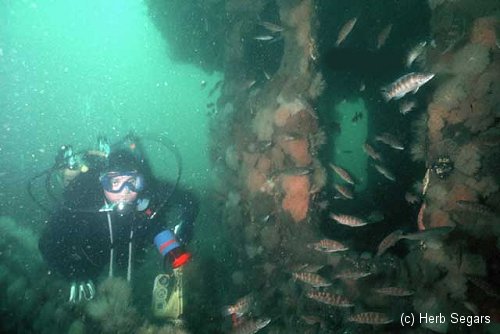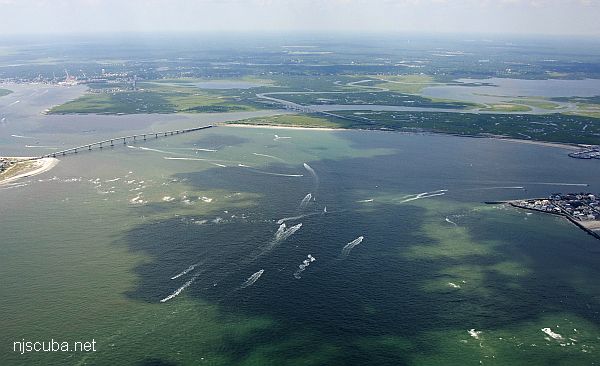Dive Training - Getting Started
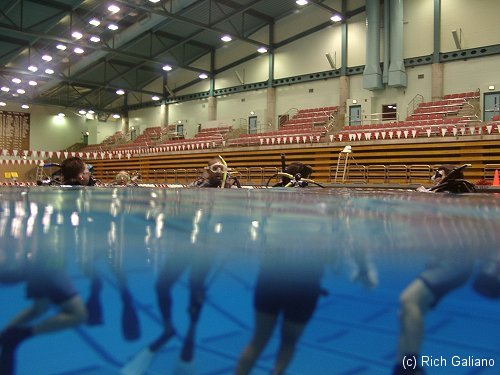
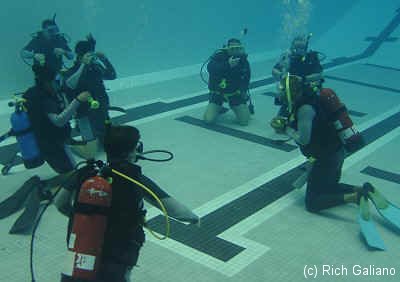
Scuba diving in the United States is by and large not regulated by the government ( as opposed to Australia and other places, where it is. ) This remarkable fact is the result of the scuba industry's so-far successful efforts to head off government meddling by putting forth their own standards for training, equipment, and other specifics. In fact, all the major diving certification organizations and manufacturers actually got together and agreed on a basic set of requirements for the industry, and even have an ISO-9000 certification for it.
Therefore, no matter which training organization you choose, you will get the same basic curriculum. That is not to say they are all identical - each organization will emphasize different aspects that it considers most important. Some are more practical and realistic than others, and this will also depend to a large extent on your individual instructor. For example, some adhere religiously to a curriculum that is suited strictly for the tropics, while others prepare you better for local conditions. In terms of membership size, PADI is the biggest, but this does not really matter unless you plan to go all the way and become a professional, in which case it is advantageous to be a member of one of the bigger organizations. Other major certifying agencies include SSI, SDI, and NAUI. There are links in the Directories section.
Medical Concerns for Scuba Diving
There are a number of medical conditions which would disqualify you for scuba diving:
Chief among these is asthma - Reactive Airway Disease - or other respiratory problems which could obstruct airflow in the lungs. A severe asthma attack underwater could result in lung over-expansion injuries, embolism ( see below ), and even death. Allergy-induced asthma is generally not a problem. Exercise-induced asthma used to be an immediate disqualifier, but there are now some medications that, taken on a daily basis, may control the problem sufficiently that the sufferer can successfully participate in scuba diving after completing an exercise challenge.
Embolism with regard to scuba diving is a rupture of the lungs, allowing air bubbles to enter the body cavity and/or bloodstream.
'Ordinary' allergies, such as pollen, dust, or pets, are not usually a problem. Compressed air breathed from scuba tanks underwater is the purest, most highly-filtered air you are likely to find anywhere, and, if anything, most allergy symptoms will abate while diving rather than worsen. ( There are some people who are allergic to aspirated saltwater spray, which would definitely be a problem. )
Any lung injury or disease that might cause weakening of the lung walls, which could result in a rupture and embolism, is likely to be a disqualifier for scuba diving. Any history of this is cause to seek medical advice before diving.
Not surprisingly, smoking and diving go very badly together. Smoking distorts the body's natural breathing control mechanism, which can result in underwater blackout and drowning. This is especially dangerous for deep and/or strenuous diving. Also, the carbon monoxide in cigarette smoke binds tightly with hemoglobin, greatly reducing the blood's oxygen-carrying capacity for several hours after the fact, and giving smokers horrible air consumption rates compared to nonsmokers. Good divers don't smoke.
Persons on any kind of medication should check with their doctors before diving. The effects of medications on the body at the elevated pressures encountered in scuba diving is a very poorly understood subject. Likewise, the effects of diving on pregnancy are not well understood, and so should be avoided. Of course, users of narcotic drugs or alcohol should not dive, or drive, or do anything.
Any history of epilepsy or other seizure, or condition that might lead to seizure, such as severe diabetes, is a disqualifier for diving. If such an event were to occur underwater, drowning would be the inevitable result.
continued ...
Before you even start, you should be aware that diving can be physically strenuous. Dive gear is fairly heavy, and there may be times when you will be required to cover some distance with it, both in and out of the water, as well as climb up and down ladders, stairs, hillsides, dunes, and whatever else may be at your dive site. You should be physically fit, a competent swimmer, and generally comfortable in the water. See the sidebar for a short list of medical disqualifiers for scuba diving.

Getting water up your nose and in your eyes and ears is one of the nasty little secrets of diving, and something you will have to get used to. The process of adjusting your ears to increased water pressure as you descend is known as "clearing." This is neither automatic nor inborn, and beginners often have a great deal of trouble with it. Their discomfort is a matter of both being overly sensitive to the new sensation, and a lack of skill with the proper techniques to alleviate it. There are several such techniques, all of which are quite simple, and everyone eventually finds one that works for them and overcomes this hurdle.
Likewise, breathing underwater is unnatural, and the proper technique must be learned, although this is rarely a stumbling block. In cold water environments, a close-fitting hood together with the view-limiting mask and often limited water clarity can be claustrophobic for some people. Most dive shops offer an inexpensive "Discover Scuba" mini-class, which will not make you a certified scuba diver but will let you safely find out if you like it or not.
All the training programs start out with an "Open Water", or OW course. ( There are some courses lower than this, most having the word "snorkel" in the title - don't bother with them. ) The Open Water course will be a fair amount of classroom work - reading and problem-solving, and some math - to learn the rudiments of the science and physics involved in safely going places that our bodies are not designed to go.
... continued
A heart condition known as Patent Foramen Ovale, or PFO, is another potential disqualifier for scuba diving. The foramen ovale is a vent or valve between the two sides of the fetal heart, which closes up within a year after birth. In some cases, the hole does not close completely, allowing blood to shunt from right to left atria, bypassing the lungs. PFO is present to some extent in about 30% of people with otherwise normal heart function and is not a life-threatening condition. In fact, it usually goes unnoticed. The danger when diving ( mainly for decompression diving, much less for ordinary sport diving ) is that a PFO could allow tiny air bubbles in the bloodstream, which would normally be eliminated in the lungs, to reach the brain. This could cause stroke or seizures, which would likely be fatal underwater. PFO is not detectable by EKG, but it is detectable by ultrasound methods and is surgically correctable ( although open-heart surgery for the sake of scuba diving is probably not worth it. ) Any family history or suspicion of PFO, or any other heart condition, should lead you straight to your doctor before doing any kind of diving activity.
Although it is seldom mentioned, diving is a purely visual activity, and blindness or near-blindness would make it a difficult and dangerous activity, not to mention pointless. Hearing problems, on the other hand, are not an issue, as we all are pretty much functionally deaf while diving. We can still hear, but it isn't one of the more useful senses underwater.
There is also a certain mental suitability for diving. If you are flighty, panicky, claustrophobic, afraid of fish ( don't laugh, I've seen it ), or afraid of the water, diving is probably the last thing you should be doing. You must be comfortable in the water before you even think about learning to dive - if you are not, taking a scuba class will do nothing to increase your level of comfort and confidence. And if you can't swim, for God's sake, learn how first!
Studies have shown that persons with highly conditioned athletic builds are actually at somewhat greater risk for decompression sickness that 'ordinary' people, but this applies only for extreme diving, and is not a concern for typical recreational diving. Obese persons are also at a higher risk, but mainly because the subject has not been extensively studied. In general, though, scuba diving does not require great physical conditioning. If you are grossly out of shape, you should do something about it - start working out regularly - but otherwise, most anybody can dive, at least in the easy tropics. Conversely, many persons that would normally be considered disabled can find a new world of weightless freedom underwater.
This is by no means an exhaustive or authoritative list of medical factors for diving, nor am I a medical doctor. If you are unsure, talk to a diving instructor or see your doctor before signing up.
Ironically, much of the water work in the Open Water class will be confined to a swimming pool, but at the end, there will be several dives at a protected outdoor location - a lake or quarry around here, or the open ocean down south where things are easy. In the OW course, you will learn skills such as dive planning, scuba equipment assembly and use, ascents, descents, buoyancy control, swimming with fins, and simple emergency procedures. It is possible to opt-out of the final dives locally, which are likely to be in cold water, and finish your certification somewhere in the tropics by taking "referral". This is a great excuse to go down to the sunny islands, and makes a great introduction to your new hobby. A lot of people don't ever want to go in the water around here, and that's just fine for them.
You shouldn't need to buy a lot of gear for your OW course, in fact, there are many things you can't buy yet. The operator should provide all the necessary equipment for free or for a small fee, although before you are finished you will likely have bought a few small items of your own, such as mask, fins, and snorkel. When you are all done, you will get your certification card, or "C-card", as it is known, not issued by any government agency, but by your certifying organization. With this, you can now buy or rent dive gear, get air fills, and go diving. Almost all operators and organizations honor each other's C-cards, the world over.
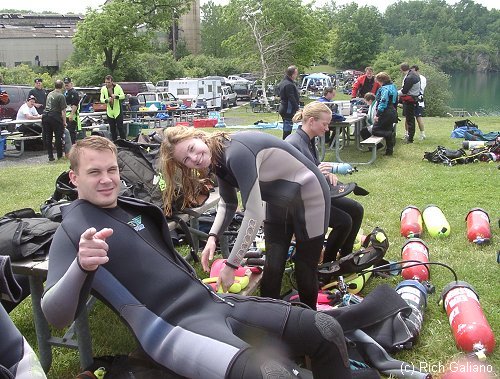

For many people who only plan to dive once or twice a year in the tropics, this level of training may suffice. However, if you plan to dive in cold water, and especially locally, I would call Open Water certification nothing more than a license to drown yourself. In fact, so do most responsible local dive operators, who will likely refuse to take you out, at least not without your instructor. At this level, you simply do not have the knowledge or experience to handle local conditions.
For anyone who is really interested in diving, and I strongly recommend this for all divers, the next step is "Advanced Open Water", or AOW. This class has virtually no bookwork, although there is some preparatory reading. Instead, it is almost all real practical diving - underwater navigation, search and recovery, night, boat, beach, and wreck diving, and other skills. This is the class where you will really learn how to dive and is the minimum level of training you should seek for local cold-water diving. When you finish, you will get an AOW C-card.

At this point in your new diving career, it would be a good idea to head south and get some easy experience in the tropics. The water is warm, clear, and calm, the fish and coral are pretty, and you can quickly put a dozen or more practice dives in your logbook without the hazards and difficulties of northern diving. Then, if you are truly serious about local diving, come home and prepare to spend some money. Dive gear is not cheap, especially gear that is suited for local conditions, and the sort of beat-up rental gear that may be OK in Florida will simply not cut it around here.
In my opinion, OW and AOW are misnamed and misbegotten, and should really be Warm Water and Cold Water diving. If you do plan to take the advanced course and eventually become a northeast diver, do it here. That way you can become familiar with cold water, and the conditions, equipment, and methods that go with it, in a controlled and supervised environment. Taking an AOW class in the tropics is a complete waste - it is far too easy in the warm clear water, and you won't learn nearly as much or gain the same kind of experience.
Beyond AOW, there are myriad offerings in continued education. After all, scuba is a business and your instructor has bills to pay. ( P.A.D.I. -- Put Another Dollar In ! ) Medic First Aid and Rescue Diver are worthwhile classes to take, as are many of the mini "Specialties" that are offered, such as U/W Photography & Video, U/W Hunter, Dry Suit, Nitrox, etc. Honestly, many of these you could also teach yourself, but if you like taking classes and collecting C-cards and nifty patches, then knock yourself out. Some people have dozens or even hundreds of C-Cards.
The minimum age for the OW course has recently dropped to ten years. My own personal observation on this is that it is an exceptional ten or even twelve-year-old that has the focus and mental ability, and the physical size and strength, to safely learn to scuba dive. Boys tend to be lacking in the first two areas, girls in the second two. Realistically, fourteen or fifteen is a better age to start, although there are pool-only programs that are fun and suitable for younger folks.

